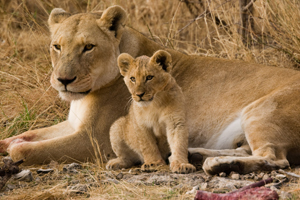
Your complimentary articles
You’ve read one of your four complimentary articles for this month.
You can read four articles free per month. To have complete access to the thousands of philosophy articles on this site, please
Books
Does Altruism Exist? by David Sloan Wilson
William Irwin asks if pure ethics exists at all.
Does Altruism Exist? poses an important question of enduring interest in both philosophy and biology. On one level – the level of outward action – the answer is obviously yes. If all we mean by ‘altruism’ is ‘performing actions that benefit others’, then clearly altruism exists. From an evolutionary perspective, however, there is still something in need of explanation: If making the sacrifices necessary to help others costs an organism without benefitting that organism, why would it take such actions? Why, for example, would a mother lion feed and care for her offspring?
For some time the dominant explanation in evolutionary biology has been the selfish gene theory popularized by Richard Dawkins, according to which genes are the basis for selection. Thus while it may not be in the interest of a particular lion to expend resources to feed and protect her young, it is in the interest of the mother’s genes that she do so, and so lions, like other animals, have evolved instincts to feed their young. Genes are really running the show, and they’re using individual organisms as vehicles for their replication. Of course it is not just offspring who benefit from altruistic behavior. If the cost is not too great, then animals will help others too – generally speaking, those with whom they have some relatively close genetic connection.
In contrast, group-level selection theory says that natural selection operates at the level of the group, and that a group of organisms that coordinate their activities for a common purpose can be practically conceived of as a superorganism in competition against other groups. For decades group-level selection theory was dismissed, but David Sloan Wilson is among the leading advocates for it today. Indeed, throughout much of Does Altruism Exist?, Wilson writes as if the matter has already been settled in favor of multilevel selection theory – the idea that selection occurs on multiple levels, including both groups and genes. For the record, the matter is not settled. Dawkins and most other biologists continue to oppose the idea. No matter which side of the debate one takes, however, it is clear that groups and the pressures they exert play some role in the process of natural selection. Indeed, Wilson argues that “The theories that claimed to explain altruism without invoking group selection turned out to invoke group selection after all, in every way except using the name” (p.34).
Thoughts & Feelings

Why does a lioness feed and care for her cubs?
© Greg Willis 2006
The debate among biologists concerns altruistic activity, but philosophers are also concerned with altruism in thoughts and feelings. And here the answer to the book’s eponymous question is unclear. Wilson devotes an entire chapter to psychological egoism: the thesis that all actions are ultimately taken in the name of self-interest. This idea is currently also out of favor, although historically it was advocated by such canonical figures as Thomas Hobbes and Jeremy Bentham.
Psychological egoism is highly vulnerable to counterexample because it makes a universal claim. To disprove it, all we need is one example of one person who at one time decided not to act in her perceived self-interest. The classic counterexample is Mother Teresa. Didn’t she repeatedly and willingly take actions to help the poor at great cost to herself? The psychological egoist has to respond that she did what she did ultimately because of self-interested motivation. Maybe she did it for the promise of heavenly reward; maybe she did it because it made her feel good about herself; maybe she didn’t even consciously know the reason she acted – but at bottom her actions were motivated by self-interest. Wilson seems to concede that there is no way to disprove psychological egoism because we have no way to read minds and no access to the subconscious motivations of either ourselves or others. However, he believes that what matters most are not the thoughts or feelings motivating people, but the actions they take.
Focusing on actions rather than thoughts or feelings, Wilson’s constant refrain is that “Selfishness beats altruism within groups. Altruistic groups beat selfish groups. Everything else is commentary” (p.71). On group-level selection theory it is no surprise that people act to benefit others. Within a group an altruist may be taken advantage of by a selfish member, but a group without altruists will be outcompeted by a group that includes them. Think of a basketball team. An unselfish player who passes the ball when she sees a teammate who is placed for an easier shot may not get much glory, and may even be overlooked by her teammates; but a team with at least a player or two who passes unselfishly will easily defeat another team whose players never pass. And as Wilson sees it, it is the action that matters. We might prefer a team in which every member is thinking of the good of the team with every action she takes; but what really matters is that she takes the action that’s in the best interest of the team, whether it’s passing, dribbling, or shooting. Using a different metaphor, Wilson says we may prefer to be paid in cash, but we should be willing to be paid with a check: that is, we might prefer altruism at the level of thoughts and feelings, but we should be willing to accept altruism at the level of actions.
One area in which we would expect thoughts and feelings to matter is religion. It would seem that many religions demand not just that we do the right thing and help other people, but that we do it with the right mindset. For example, from a religious standpoint it would seem that it’s not enough that I volunteer at a soup kitchen. If my reason for volunteering is to impress and get close to someone cute, then my volunteering doesn’t seem particularly praiseworthy. Wilson, however, cites a study by the Templeton Foundation which finds that even across a variety of religions, including Judaism, Christianity, and Islam, thoughts and feelings are not ultimately what matter: it is ultimately the other-helping behavior that matters. The altruistic religious ethic seems difficult to reconcile with these findings, but on Wilson’s interpretation, other-helping actions and a self-interested desire for heaven can go together. Certainly some denominations would agree. For other religious groups, though, thoughts and feelings are paramount and the ideal of pure altruism is alive and well. For instance, to lack a feeling of love for others behind one’s altruistic actions would be problematic for some Christians. Love of God and love of neighbor should be one’s motivation, and heaven should be the natural reward of that, not the primary motivation for it.
Altruism & Economics

Michael Douglas as Gordon Gekko in Wall Street
© 20th Century Fox 1987
Whereas altruism and religion seem natural allies, altruism and economics seem natural adversaries. Then again, it depends on whether we are considering altruistic actions or altruistic thoughts and feelings. In the chapter on economics, Wilson ties group-level selection theory to Elinor Ostrom’s pioneering work showing how small groups regulate themselves and adapt to local environments through mutual benefit. The rest of the chapter is disappointing unless one simply wants to hear Wilson validate one’s disdain for the free market.
Wilson was apparently surprised to discover that Adam Smith didn’t advocate the kind of narrow self-interest that people mistakenly attribute to him. Indeed, Wilson seems reluctant to accept that selfishness is a narrow form of self-interest that involves disregard for others, whereas self-interest more broadly construed – as Smith does indeed construe it – involves benefitting others. Mischaracterizing free-market thinking in general, Wilson says that “it was a monumental mistake to conclude that something as complex as a large society can self-organize on the basis of individual greed” (p.114). It sounds as if Wilson is thinking of Gordon Gekko, the trader from the movie Wall Street, who claimed that greed is good. But real free-market economists Milton Friedman and Friedrich Hayek said nothing of the sort. Not even Ayn Rand thought that greed is good. Rand was extreme in many ways, but the heroes in her novels are not materialistic or greedy. They are, however, self-interested.
Self-interest is not equivalent to greed or any other kind of selfishness. In fact, it is very often in our own self-interest to treat others well. The storeowner who overcharges her customers will find it bad for business in the long run. Likewise, it is in the self-interest of the basketball player to pass to the teammate with an open shot. After all, she wants to be part of the winning team. Curiously, Adam Grant’s research, discussed in subsequent chapter, makes the very point that Wilson misses here. Grant finds that in business, ‘takers’, who try to get as much as they can and give as little as possible in return, do not do as well as ‘givers’ who give freely of themselves without expectation of return. Givers also do better than ‘reciprocators’ who play tit-for-tat. Wilson encapsulates Grant’s conclusions by saying that givers succeed “as long as they surround themselves with other givers and avoid the depredation of takers. In other words, the business world is no different than any other enterprise requiring prosocial activities” (p.130). The only real surprise here is that Wilson finds this surprising. The self-interested wisdom of serving others has long been known, and is captured well in the old Rotary Club motto, “He profits most who serves best.”
Wilson would have done well to discuss Hayek’s The Fatal Conceit (1988), which nicely connects the spontaneous ordering of evolution and the spontaneous ordering of free market economies. The basic insight of Hayek’s book is crystallized in his conclusion that “The curious task of economics is to demonstrate to men how little they really know about what they imagine they can design” – the point being that an economy without central planning and heavy government regulation can communicate economic information much more efficiently through the price mechanism than any centrally planned alternative.
I have focused my comments in this review on areas where I disagree with Wilson, but in closing I hasten to add that Does Altruism Exist? is an impressive and engaging survey of the vast terrain covered by his title question. Anyone intrigued by the subject will find this short book to be highly readable, and often insightful.
© Prof. William Irwin 2016
William Irwin is Herve A. LeBlanc Distinguished Service Professor at King’s College in Pennsylvania, and the author of The Free Market Existentialist: Capitalism Without Consumerism (Wiley-Blackwell, 2015).
• Does Altruism Exist? Culture, Genes, and the Welfare of Others, by David Sloan Wilson, Yale UP, 2015, $27.50, 224 pps, ISBN: 0300189494









